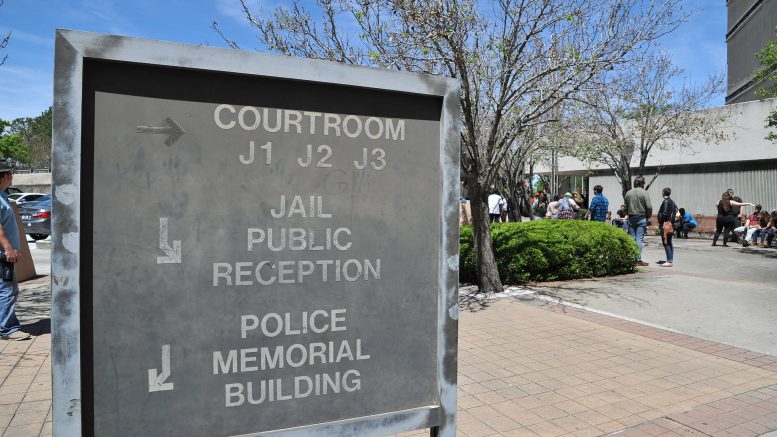A new lawsuit could upend Jacksonville’s system of detaining poor defendants charged with minor crimes.
The lawsuit filed Thursday says Jacksonville’s system of money bail — that is, someone charged with a crime must pay a set amount to be released without regard to the defendant’s ability to pay — violates poor defendants’ rights to equal protection under the law.
The current system allows the wealthy to be released from jail while awaiting trial, but those who can’t afford cash bail must wait.
Three defendants recently arrested filed the lawsuit, saying judges should consider a defendant’s ability to pay. For example, Jonathan Daniels is 39, unemployed and homeless. He was arrested Aug. 26 on a charge of petit theft on an allegation that he stole a bicycle. According to a predetermined bond schedule, Daniels would have had to pay $1,508. Because he couldn’t afford that, he had a hearing in front of a judge. At that hearing, the judge increased the bond to $10,003. Daniels is still in jail.
The lawsuit only addresses defendants charged with misdemeanors, and it is largely modeled on one in Harris County, Texas, that led to a federal judge’s ruling that the county couldn’t detain people just because they were too poor to post bond. That lawsuit now awaits an appellate court’s ruling.
Chief Judge Mark Mahon, State Attorney Melissa Nelson and Jacksonville Sheriff Mike Williams all didn’t offer comments on the lawsuit.
Bill Sheppard, a local civil rights attorney who filed the lawsuit, said this is the first step. “I figured what I’d try to do is approach it piecemeal, but I think the argument applies as well to felonies,” he said. “Do you realize how much we’re spending on that jail?”
It’s not clear just how much the Sheriff’s Office could save if it stopped housing misdemeanor defendants.
According to a January report from the state Department of Corrections, Duval has more misdemeanor defendants in jail on any given day than any other county in the state. Of the county’s daily average of 3,029 inmates, 15 percent — or 444 — are misdemeanor defendants.
Similar lawsuits have also been filed in San Francisco and in Georgia.
Mahon said Thursday he hadn’t yet read the lawsuit, but he said he probably wouldn’t comment on pending litigation. In a previous interview about one judge’s reputation for setting unusually high bonds, Mahon said “that is something that is about the law and the conscience of the judge. Some judges feel very strongly about different offenses. Some judges feel very strongly about alcohol, that they are a danger to themselves and to the community.”
The Florida Constitution specifically guarantees the right for criminal defendants to be released prior to trial. Only “if no conditions of release can reasonably protect the community from risk of physical harm to persons, assure the presence of the accused at trial, or assure the integrity of the judicial process” can a jail refuse to release the defendant.
Nelson has told the Times-Union in the past that she is writing a new bail policy for her office, and she has said she supports bail reform.
“We are training lawyers right now they cannot punish anybody for indigency. They are supposed to follow the statute, which is [defendants can only be detained if they are a] flight risk or danger to the community. If they are neither, we are not interested in prosecutors using the jail as pre-trial detention.”
The lawsuit is one of many recent examples of the issue of bail reform gaining prominence as activists nationally question why those who haven’t been convicted are being held in jail. Prosecutors sometimes offer to allow defendants to get out of jail immediately if they plead guilty to crimes. Defendants who can’t afford bail must then decide if they’d rather stay in jail and fight the charge or accept guilt so they can get out. Those convictions can then affect their ability to work, to stay in their apartments and to receive government assistance.
“For misdemeanors, one of the big problems is you can be in a situation where somebody actually pre-serves their entire expected sentence” before conviction, said Paul Heaton, the academic director of the Quattrone Center for the Fair Administration of Justice at the University of Pennsylvania Law School. Heaton is a key economist working in the justice realm, and his research on bail was critical to the Harris County lawsuit. “If I want to actually continue forward with my case I have to prolong my punishment. That can be actually very detrimental and increase errors and wrongful guilty pleas quite a bit when you have those sorts of perverse incentives. You’re running what are essentially these plea mills.”
Tara Wildes, the Jacksonville Sheriff’s Office’s former director of corrections who retired last year, said the office should expand its pre-trial services, a program that screens if defendants are good candidates for release. The program then monitors those defendants who are released. Right now the Sheriff’s Office will assess some defendants accused of certain types of misdemeanors to see whether the judge should release the defendants or not. Ultimately, though, the decision rests with the judge. Wildes said that the jail reduced its daily population by about 350 people by starting the pre-trial services unit. The unit only reviews a small portion of cases right now, but Wildes said Sheriff Williams should expand it to assess almost all defendants, even those accused of felonies.
“It would be an easy solution to this problem,” she said. Also, the Sheriff’s Office needs to start issuing citations much more often and stop arresting people. Except for cases with violence or drunk driving, Wildes said, she doesn’t see why an officer couldn’t use a citation that requires a defendant appear in court, rather than arresting them. This is more common in other jurisdictions.
Besides, she said, the defendants aren’t even the ones paying the bonds. “In most cases, it’s going to be a family member who hasn’t committed any crime.”
Keeping non-violent people in jail, she said, causes more harm than good. People can lose their jobs, they’re exposed to more violent criminals, and they’re separated from families.
Insha Rahman, who works on bail issues for the data-driven Vera Institute of Justice, said studies actually prove what Wildes said. Even just two or three days in jail can cause defendants to be much more likely to commit a crime. People can lose their jobs, housing and even have their children taken away. “It’s enough to destabilize a person. All the things that keep people away from the justice system are disrupted when you put someone in jail.”
Heaton agreed. “Detaining someone, this is one of the most coercive powers of the state, and I think we need to be using it very sparingly.”
Cherise Fanno Burdeen, the executive director of Pretrial Justice Institute, said there are two key problems with the way cash bail works: First, poor people who don’t pose a public risk stay in jail because they can’t afford to post bond; secondly, wealthy people who do pose a public risk get out of jail because they can afford bond. Instead, judges should release those who aren’t a risk more often without any cash bond; and they should hold those who are a risk without offering a cash bond.
She said she’s excited about this lawsuit because it’s happening in Florida, a state that she said has been particularly resistant to reform. She pointed to Washington, D.C., or New Jersey as ideal systems where defendants are much less likely to spend their time in jail before a conviction.
Eventually, she said, the reform efforts will spread to felonies because the same principle Sheppard’s lawsuit argues — that the only people left in jail are those who are too poor to afford bond — also applies to felony cases.
Sheppard felt confident his lawsuit will catch on across the state. “This is going to spread like wildfire. It’s going to save the state millions.”
For more information, please visit jacksonville.com.
Source: jacksonville.com





Be the first to comment on "Lawsuit Says Jacksonville Can’t Jail Defendants for Being Too Poor to Pay Bail"